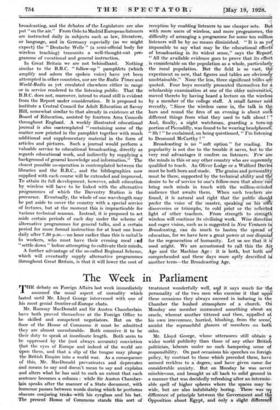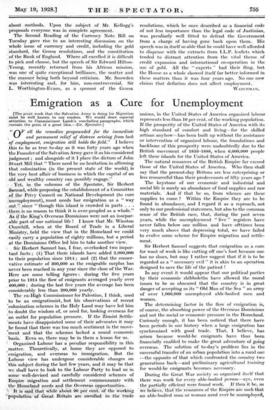The Week in Parliament . T HE debate on Foreign Affairs
last week immediately assumed the usual aspect of unreality which lasted until Mr. Lloyd George intervened with one of his most genial frontier-of-Europe chats.
Mr. Ramsay MacDonald and Sir Austen Chamberlain have both proved themselves at the Foreign Office to be skilled and competent negotiators. But on the floor of the House of Commons it must be' adniitted they are almost unendurable. Both' conceive it to be their duty to speak at inordinate length. Both seem to be oppressed by the (not always accurate) conviction that the eyes of Europe and indeed of the world are hpon them, and that a slip of the tongue may plunge the British Empire into a world war. As a consequence of this, Mr. MacDonald prevaricates and deprecates and means to say and doesn't mean to say and exPlains and alters what he' has said 'to such ari extent that each sentence becomes a column : while Sir Austen' Chamber- lain speaks after the manner of a State docunient, with immense pauses between words during which "he' performs obscure conjuring tricks-with 'his eyeglass and his hat. The present House of Commons stands this sort of treatment wonderfully well, and it says much for the personality of the two men AO exercise it that upil these occasions they always succeed in inducing in the Chamber the hushed atmosphere of a church. OA Monday one 'member murmured something about 4111 oracle,' whereat another tittered and then, appalled at his 'own irreverence, hurried, blushing, from the scene; amidst the reproachful glances of members on botfi sides.
Mr. Lloyd George, whose utterances still' obtain a wider world publicity than those 'of any other British politician,' labours under no such hampering sense of responsibility. On past occasions his speeches on foreign policy, -by contrast to those which preceded them, have seemed reckless to a degree, and- have given cause >for considerable anxiety. But on Monday he was nevei mischievous, and brought us all back to solid ground' in a manner-that was decidedly refreshing-after an intermin- able spell of higher spheres where the spaces may be wide, brit are - also indubitably boring. There was difference of principle between the Government and thc Opposition about Egypt, and only a slight different about .methods. Upon the subject of Mr. Kellogg's proposals everyone ,was in 'complete agreement.
The Second Reading of the Currency Note Bill on Tuesday gave rise to an interesting discussion. on the whole issue of currency and credit, including the gold standard, the Genoa resolutions, and the constitution of the Bank of England. Where all excelled it is difficult to pieik and choose, but the speech of Sir Edward Hilton- ;Young, recently, returned from his African mission, was one of quite exceptional brilliance, the matter and the manner being both beyond. criticism. Mr. Snowden ,was interesting -and, for him, non-controversial. Sir L.. Worthington-Eyans, as a sponsor of the Genoa resolutions, which he once described as a financial code of not: less importance than the legal code of. Justinian, was peculiarly well fitted to defend. the Government from a charge of having gone _ back .upon them. His speech was in itself so able that he could have well afforded to dispense with the extracts from I.L.P. leaflets which tended to' distract attention from the vital theme „of credit expansion and international co-operation in the use of gold. All the " experts " had their fling, but the House as a whole showed itself far better informed in these matters than it was four years ago. No one now claims that deflation does not affect employment.
WATCh MAN.



































 Previous page
Previous page